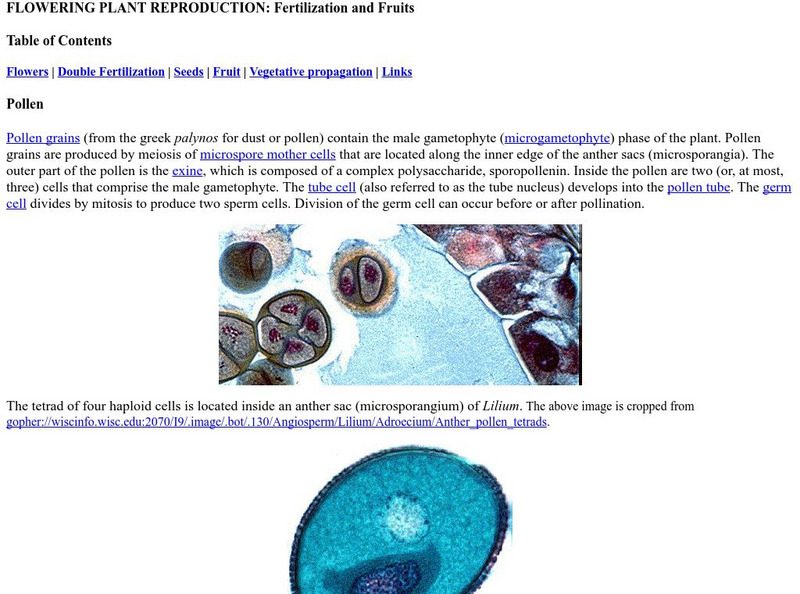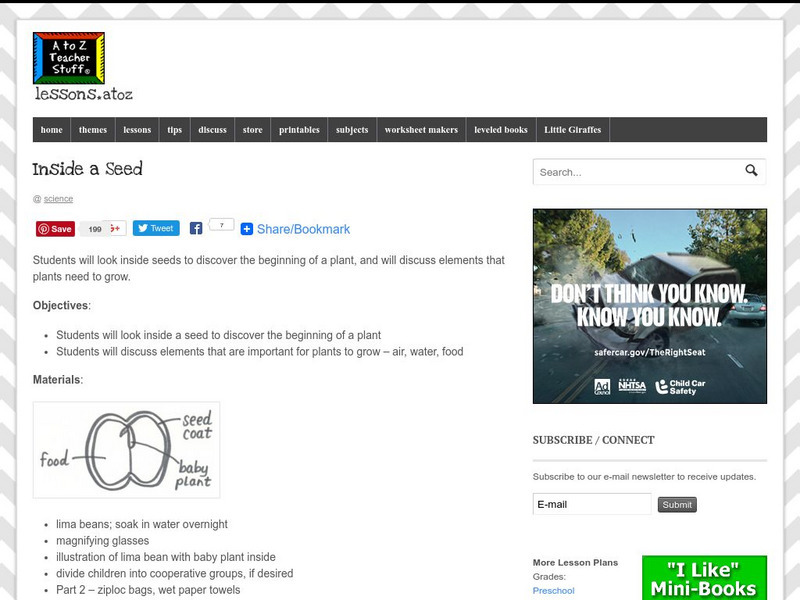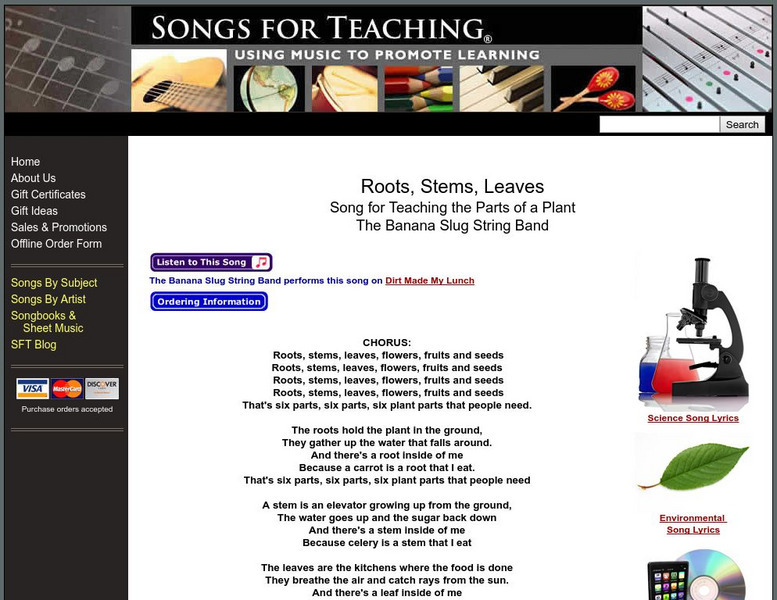Science Education Resource Center at Carleton College
Serc: Mn Step: Seed Investigation
A instructional activity where pupils learn about seeds, how to identify them, and characteristics of different seeds.
Estrella Mountain Community College
Flowering Plant Reproduction: Fertilization and Fruits
Provides information and illustrations of the reproduction process in flowers. Learn more about flowers, double fertilization, seeds, fruit and vegetative propagation.
Other
Parts of Plants
Each part of a plant has a very important function. All plants produce flowers for the same reason: to make seeds so another plant can grow.
Center of Science and Industry
Cosi Columbus: Mighty Seeds
Learn about the process of germination in this hands-on science experiment. Includes full list of materials, procedures, and scientific explanation of why plants can survive in a variety of environments.
PBS
Pbs Teachers: Scientific American: Unearthing Secret America: Nutrient Depletion
Investigate the change in American society and slavery with the advent of the agricultural innovation of crop rotation. Observe nutrient depletion as you germinate and grow nutrient-demanding seedlings.
US Department of Agriculture
Choose My Plate: All About the Protein Group
Read about the foods that qualify as proteins and how much amounts to one serving of each.
Other
Woodland Trust: Nature Detectives
Become a nature detective when you join the wildlife club. There are an abundance of activities to do, fun things to create, games and puzzles to play, and much more all designed to help you become a nature expert.
ClassFlow
Class Flow: Parts of Seeds, Plants, and Flowers
[Free Registration/Login Required] In this flipchart students get the opportunity to learn the parts of seeds, plants, and flowers. There are also interactive activities and assessment available.
Other
Backyard Gardener: Seed Germination Database
An extensive database of seeds. Learn how the different types of seeds germinate. Information is from Thompson and Morgan.
A to Z Teacher Stuff
Atozteacherstuff: Inside a Seed
atozteacherstuff lets you take a closer look at the inside of a seed by using this lesson plan to "discover the beginning of a plant."
Songs for Teaching
Roots, Stems, Leaves Song and Lyrics
Learn about the parts of a plant as you sing this catchy song. You can listen to others sing it, or sing along with the supplied lyrics. Songs help information "stick" with you!
BiologyWise
Biology Wise: Seed Germination the Primary Phase of Plant Growth
Describes the structure of seeds, the conditions needed for seeds to germinate, and the steps involved in germination. Also discusses germination in dicots and monocots.
BiologyWise
Biology Wise: Monocot vs. Dicot
One way plants have been classified has been based on the number of cotyledons in the seeds. The differences between monocots and dicots are listed along with some helpful facts.
Science4Fun
Science4 Fun: Seed Germination
Resource describes the process of germination and includes the parts of a seed, environmental conditions, and rate of germination.
HotChalk
Hot Chalk: Lesson Plans Page: Kick Off Seed Explorations
This simple lesson plan is designed to have young learners become more familiar with fruit seeds by identifying fruit that contains seeds/no seeds, gathering seeds from fruit, explaining the importance of seeds, explaining that seeds...
HotChalk
Hot Chalk: Lesson Plans Page: Planting Seeds
This simple lesson plan is designed to help young students be aware of how seeds sprout, and that seeds grow into plants.
PBS
Pbs Teachers:a Model of Seed Dispersal
Investigate propagation systems in plants, and explain the ways some animals disperse seeds through their digestive processes. Role-play and map the daily travels of one seed-bearing animal to explore the migration of seeds.
Royal Botanic Gardens
Royal Botanic Gardens: Millenium Seed Bank
The Millenium Seed Bank is one of the Millenium Commission's National Landmark projects. Visit this site to learn how this project hopes to conserve seed samples.
Curated OER
Clip Art by Phillip Martin: Seeds
A clipart illustration by Phillip Martin titled "Seeds."













